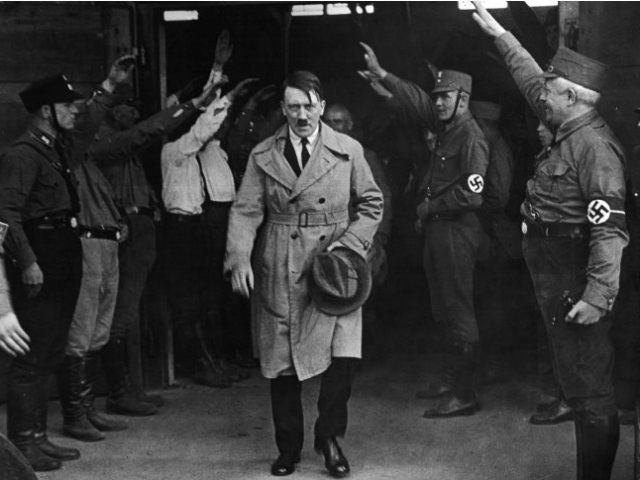German historian Harriet Scharnberg has published an article claiming that the Associated Press actively worked with Nazi Germany in the Thirties.
Scharnberg says that in order to preserve media access to Hitler’s regime, the AP was willing to publish material supplied by the Nazi propaganda ministry, obeyed fascist restrictions against unflattering news coverage, and hired reporters who worked for the Nazis, including the dreaded SS.
Scharnberg’s work, published in the academic journal Studies in Contemporary History, is summarized by the UK Guardian, which notes it was among the many international publications banned by the Nazis for refusing to play along. The AP was able to remain operational in the Third Reich until the United States entered World War II in 1941.
“Coming just before Associated Press’s 170th anniversary in May, the newly discovered information raises not just difficult questions about the role AP played in allowing Nazi Germany to conceal its true face during Hitler’s first years in power, but also about the agency’s relationship with contemporary totalitarian regimes,” the Guardian charges, specifically hitting the AP for opening a news bureau in North Korea and citing a number of “significant events” left curiously uncovered by the AP’s Pyongyang bureau.
Indeed, such questions have been asked about many international media organizations. Morally questionable concessions were made to such latter-day monsters as Saddam Hussein, in order to preserve press access to his regime. It never takes too much arm-twisting to get most Western media outlets dancing to Fidel Castro’s tune.
New Media has also seen its independence challenged, as social media giants and international software companies are often subjected to content controls by authoritarian states like Russia, China, and Turkey. International media consumers are not often made aware of the free-speech compromises quietly made in exchange for access to certain regimes.
Alas, the current U.S. administration is also a regime that demands certain concessions from the media, in exchange for access, leaving the American people with an illusion of fiercely independent press coverage that does not reflect reality.
It should go without saying that few regimes sit anywhere near Nazi Germany on the spectrum of corruption and homicidal evil. (North Korea is definitely one of them.) The Nazis were downright industrial in their control of the press and well understood the importance of influencing international media.
The Guardian quotes Scharnberg’s argument that Associated Press cooperation with the Nazis helped them “portray a war of extermination as a conventional war”:
In June 1941, Nazi troops invaded the town of Lviv in western Ukraine. Upon discovering evidence of mass killings carried out by Soviet troops, German occupying forces had organised “revenge” pogroms against the city’s Jewish population.
Franz Roth’s photographs of the dead bodies inside Lviv prisons were selected upon Hitler’s personal orders and distributed to the American press via AP.
“Instead of printing pictures of the days-long Lviv pogroms with its thousands of Jewish victims, the American press was only supplied with photographs showing the victims of the Soviet police and ‘brute’ Red Army war criminals,” Scharnberg told the Guardian.
“To that extent it is fair to say that these pictures played their part in disguising the true character of the war led by the Germans,” said the historian. “Which events were made visible and which remained invisible in AP’s supply of pictures followed German interests and the German narrative of the war.”
The Associated Press disputed Scharnberg’s conclusions in a statement to the Guardian:
As we continue to research this matter, AP rejects any notion that it deliberately “collaborated” with the Nazi regime. An accurate characterization is that the AP and other foreign news organisations were subjected to intense pressure from the Nazi regime from the year of Hitler’s coming to power in 1932 until the AP’s expulsion from Germany in 1941. AP management resisted the pressure while working to gather accurate, vital and objective news in a dark and dangerous time.
In a much longer statement released later on Wednesday, the AP argued that its Berlin bureau chief, Louis P. Lochner, was critical of the Nazi regime, possibly saved the lives of the AP’s Jewish employees by finding them employment outside of Germany, and was imprisoned for five months after Germany declared war on the United States, while American AP correspondent Joe Morton was executed by the Nazis.
The Associated Press stated that the most damning revelations in Scharnberg’s paper concerned a German subsidiary of AP Britain, which was essentially taken over by the Nazis, after which the AP labored to flag its photos as products of the German government while nevertheless judging it had “legitimate news value, as editors and the public needed to learn more about the Nazis.”
The New York Daily News chips in with a list of other corporations that did business with the Nazis, including Kodak, IBM, and Coca-Cola.
Former AP correspondent Nate Thayer concisely stated the central issue to the Guardian: “There is naturally an argument that any access to secretive states is important. But at the end of the day it matters whether you tell your readers that what you are reporting is based on independent and neutral sources.”

COMMENTS
Please let us know if you're having issues with commenting.